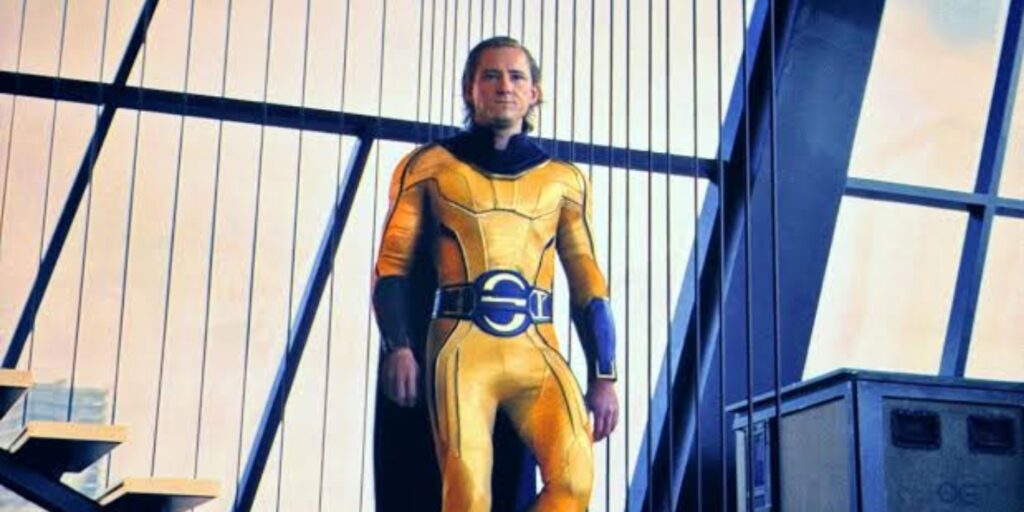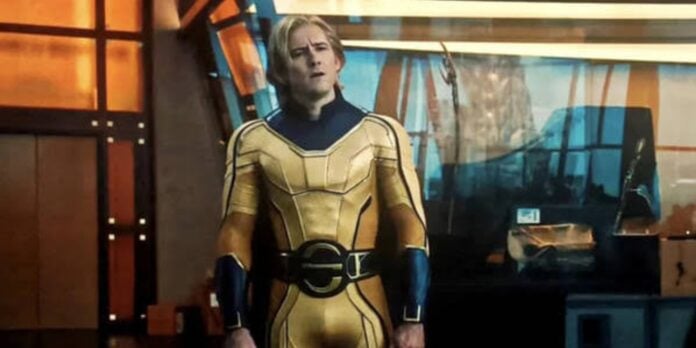Forget what you thought a Marvel movie was supposed to be. ‘Thunderbolts*’ doesn’t just break the mold, it smashes it into pieces. Sure, there are superpowers, fight scenes, and the obligatory sky-glow moment.
However, the heart of it all is something you don’t often see in a big-budget superhero flick. The film gives a deep and honest portrait of mental illness. And at the center of that storm is Bob aka Sentry played with haunting vulnerability by Lewis Pullman.
The Sentry AKA Bob’s Main Battle Was With Himself

Bob’s story starts not in glory, but in darkness. Addicted, desperate, and deeply broken, he injects himself with what he thinks is a drug to quiet the chaos in his mind. But it turns out to be an experimental super-serum. Instead of healing him, it splits him. What comes out the other side is a god. But also, a monster. The serum turns Bob into the Sentry, an impossibly powerful being capable of miracles.
Related: ‘Thunderbolts*’ Failed A Major Character Despite Being The MCU’s Redemption Arc
However, it also gives birth to The Void, his alter ego, a living embodiment of fear, depression, and destruction. The Void isn’t just a villain. It’s him. The part of him he’s tried so hard to hide, repress, or destroy. And that’s what makes his struggle so terrifying and so real. You don’t watch Bob and see a superhero. You see a man terrified of himself.
You see someone battling for control over his own mind and body, never sure if he’ll win. You see someone who doesn’t trust his hands not to hurt the people he loves. Additionally, the climax of Thunderbolts isn’t a world-ending battle. It’s a confrontation of the soul. Bob, on the brink of collapse, doesn’t face a villain; he faces himself.
And instead of the usual Marvel solution, his team shows up with something different: compassion. Yelena, Bucky, Walker, Ghost, and Red Guardian, all broken in their own ways, don’t try to subdue The Void. They reach out to Bob. They sit with his pain. They remind him he’s not alone. That he’s not a monster. That he’s human. And it works. Not because they have powers. But because they care.
Bob Suffers From Several Mental Illnesses In ‘Thunderbolts*’

What Thunderbolts does so brilliantly is refuse to treat Bob’s issues as vague “inner demons.” It puts names to the pain. His character reflects real-world psychological disorders in an unflinching way. Sentry and The Void aren’t just personalities, they’re entirely separate selves, locked in a war inside one body. It’s a striking parallel to DID, where people develop distinct identities, often as a defense against severe trauma.
In case you missed it: ‘Thunderbolts*’ Director Jake Schreier To Reportedly Helm MCU’s Long-Awaited X-Men Reboot
Bob also swings from manic invincibility to paralyzing depression. As Sentry, he’s euphoric and unstoppable. As Void, he’s lost in despair, guilt, and rage. The highs are dangerous. The lows are devastating. This rollercoaster reflects the very real emotional whiplash experienced by those with Bipolar I disorder. Additionally, he also experiences flashbacks, emotional numbness, insomnia, and guilt, all signs of PTSD.
His childhood was shaped by a mother struggling with mental illness and a violent, volatile father. These scars run deep. And when triggered, Bob spirals into hopelessness, often unable to tell what’s real. Bob’s origin is soaked in addiction. He takes the serum not out of curiosity, but from a desperate need to numb himself. It’s a chilling metaphor for how addiction often begins.
Even in moments of calm, Bob carries a constant dread, the fear of losing control, of becoming something terrible. It’s the kind of anxiety that simmers beneath the surface and poisons every peaceful moment. These diagnoses aren’t just labels. They are the building blocks of Bob’s identity. And unlike many superhero stories, Thunderbolts doesn’t try to “fix” him. Instead, it leans into the truth: healing doesn’t mean becoming someone else. It means learning to live with the parts of you that scare you.





